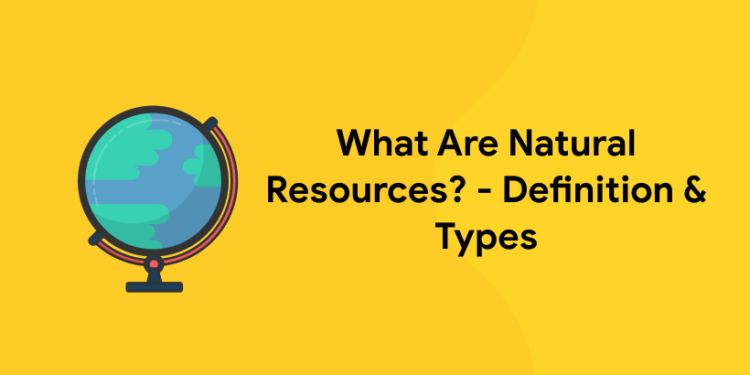Table of Contents
Human life is unimaginable without natural resources, and it is clear that because of these resources that any form of life sustained on this planet with all its comfort. Natural resources are anything and everything obtained from nature and used by us, begins from elemental air, water, and sunlight. Everyone needs to know natural resources because our survival depends on those. With the increase in population, there is a higher demand for natural resources.
What Are Natural Resources ?
Resources that are obtained naturally from the earth are called natural resources. There is no involvement of humans to derive them. These Resources are essential for the survival of all living beings. Some of the natural resources such as air, water and sunlight are used directly where others serve as raw material to produce various items based on our needs. Many of the natural resources are available abundantly in nature others take time to form and are not freely available.
Types Of Natural Resources
1: Who was the first woman President of India?
Natural Resources can be classified into two types. They are :
- Renewable Resources.
- Non Renewable Resources.
Renewable Resources
As the name suggests these resources are the one that can be renewed naturally and can be used again and again. Resources like air, water,sun etc can be used and replaced easily and resources like soil and wood can be renewed but takes little time. These renewable resources are further classified into two.They are:
- Organic – Resources that are produced from living things like animals,plants
- Inorganic – Resources that are produced from non living things like air, water and sunlight.
Attempt Free GK Mock Test – Download ENTRI App!
Non Renewable Resources
These are the resources that cannot be renewed or use again. While these resources also form naturally without any human intervention. Examples of this type of resources are fossil fuels, minerals because they from naturally as it takes thousands of years to form again making them non renewable.
Examples : coal, oil, natural gas etc.
These resources are also categorized into Organic and Inorganic resources.
Non-renewable natural resources derived from living things are called organic natural resources.
eg: fossil fuels
Non-renewable natural resources derived from non-living things are known as inorganic natural resources.
eg: wind, mineral, land, soil etc.
Free UPSKILLING Courses!
Take your first step toward mastering in-demand skills, acing interviews, and securing top-tier jobs with Entri's free upskilling courses.
Start Learning!Importance Of Natural Resources
Natural resources are important for all living things in the Earth to survive. Natural resources are available to support the incredibly complex relationship between the living and non-living things.
- Source of energy is one of the most popular importance of natural resources; natural resources such as solar radiation, wind, geothermal heat, water, tides, fossil fuels, petroleum, natural, and many more are used in generating energy.
- Provision of food is the most valuable importance of natural resources, because no man, animal, or plant can survive without food.
- Source of Raw Materials for Industries.
- Serves as Basis for Further Scientific Studies.
- Provision of shelter is one of the most popular importance of natural resources.
- Ecosystem services are benefits derived from nature and the environment and contribute much to the importance of natural resources in the environment.
- Natural resources have contributed greatly to the development of most countries in the world, in some countries of the world, natural resources account for over 90% of their revenue, therefore, the importance of natural resources can’t be over-emphasized.
Conservation of Natural Resources
All the living things depend on natural resources for survival, but not all of these are renewable. The food and water we consume, the air we breathe, and the shelter we make all derive from natural resources, so we must take steps to conserve our natural resources. Some natural resources are protected under law – others are vulnerable to overconsumption. As the population of the world is increasing at an alarming rate, the consumption of natural resources is also increasing. Hence, these resources should be conserved to maintain ecological balance and save them for future generations. However there are several ways to conserve our natural resources. Some of them are listed below.
Grab The Latest GK Study Materials – Feel Free To Sign Up Here !
Avoid The Use Of Plastic
Plastic pollutes water bodies and human bodies, and kills over one million marine animals every year. Buy appliances made from recyclable bamboo, glass, and aluminum instead of plastic.
Compost
Composting of food and other organic materials reduces methane in the environment thus by improving the quality of air.
Use Renewable Energy
Use renewable energy like solar or wind power as they does not emit greenhouse gases.
Use Eco-friendly Products
Try to buy items made from recyclable, compostable, biodegradable materials – such as glass, bamboo, recycled cardboard or paper, and organic cotton. These are likely to end up polluting our soil, water, and air.
Reuse
Reusing goods is even more eco-friendly than recycling them because recycling requires energy, the proper manufacturing facilities, and manpower. Reusing items is free when you take up hand made clothes, furniture, and toys.
Plant Trees
Planting of more and more trees to save our forest resources. Trees do so much for humanity, from absorbing carbon dioxide to providing medicine.
Reduce Water Consumption
Water is abundantly available on earth. This is the reason most of us does not concerned it more. If we use water abundantly in future we may not have much of it. However we can reduce the consumption of water by doing simple things like taking shower with less water, turn off the tap while brushing, reuse the leftover water to water the plants etc.
Attempt Free GK Mock Test – Download ENTRI App!
Restrict Usage of Paper
Paper manufacturing mainly depends on trees, as the use of paper increases it means encouraging deforestation. So use paper as much only needed and try to stop taking printouts and use e-copies.
Use Newer Agricultural Methods
Government should limit the use of pesticides, insecticides and teach the appropriate use of manures, organic fertilizers and biofertilizers to farmers. Government should be aware of new techniques like mixed croping,crop rotation etc.
Reduce Usage of Electricity
Limit the usage of electricity by making simple habits like turning off the lights before leaving your room, turn off the electric appliances after use, use of LED bulbs etc.
Spread Awareness
Spreading awareness about the conservation of nature is always an important step. It can be achieved only when many people understand its importance and the ways in which they can help. Keep our natural resources integral as it is very important for the continuation of our life on this earth. So we have to take appropriate steps to conserve our natural resources in its purest form. Only we human beings with our power and ability can save nature in its purest forms.
By carefully utilizing each natural resource and allowing it to renew itself within nature, we can help in resource conservation. We must also focus on sustainable development- a way of optimally using and balancing the use of each resource. By doing so, we can all contribute to a healthy and resourceful planet.














